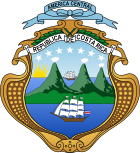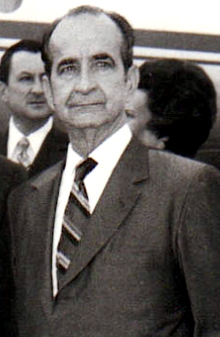 |
|---|
|
|

Figuerism or Figuerismo is a political and ideological movement in Costa Rica of social democracy and democratic socialism initiated by José Figueres Ferrer, who exercised the presidency of Costa Rica on three occasions; as de facto ruler after the Costa Rican revolution between 1948 and 1949, and then as democratically elected president twice: 1953–1958 and 1970–1974. Several Costa Rican political parties proclaim themselves as continuators of figuerism and as their most faithful representatives, among them the National Liberation Party, Citizens' Action Party and the Patriotic Alliance, all of whom pay homage to the figure of José Figueres and have personalities in their ranks close to the former president Figueres and of figuerist extraction.[1]
Figueres is remembered for, among other things, having respected the "Social Guarantees" (a series of social reforms beneficial to the popular classes enacted in the Calderón administration that were not repealed by Figueres after winning the war), for having abolished the army, approved women's suffrage, ended racial segregation (until 1949 blacks had no right to vote or leave certain areas) and the creation of the Costa Rican Institute of Electricity.
The centenary of his birth on September 25, 2006 was celebrated both by the government chaired by Oscar Arias of the National Liberation Party and in the Legislative Assembly by then main opposition force of the Citizen Action Party.[2]
- ^ "Guevara ve tres partidos figueristas en las próximas elecciones". La Prensa Libre.[dead link]
- ^ "Costa Rica celebra centenario de Figueres Ferrer quien abolió el ejército". Radio La Primerísima. Archived from the original on 2013-08-22. Retrieved 2020-01-27.
